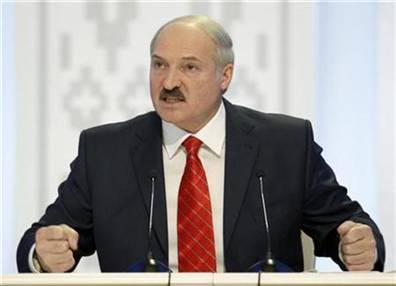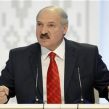
Belarus Elections End in Violence and Repressions
Publication: Eurasia Daily Monitor Volume: 8 Issue: 3
By:

The end of voting in the presidential election on December 19 was followed by a large demonstration in October Square, which eventually moved to Independence Square. There followed a violent attack by riot police that left numerous people hospitalized, seven of the nine presidential candidates under arrest along with more than 600 protesters, and widespread international protests. Alyaksandr Lukashenka was declared the election’s victor with 79.67 percent of the vote.
Despite a more open campaign than in the past, Organization for Security and Cooperation in Europe (OSCE) observers found that procedures were “bad” or “very bad” at many polling stations (ITAR-TASS, December 20). Over 23 percent voted early in the elections, having received encouragement to do so at their workplace or on public transport, as well as to vote for the incumbent president (Narodnaya Volya, December 20).
A peaceful protest planned for 8.00 pm on December 19 in October Square was well publicized in opposition websites and newspapers. By 8.00 pm over 40,000 people had gathered there. However, the authorities had turned the square earlier into an ice skating rink with loud music and it proved impossible for speakers to be heard. A decision was made to move to Independence Square, one mile down the main street of Minsk (www.charter97.org, December 19).
Presidential candidate, Uladzimir Nyaklayeu, who was bringing loudspeakers to the meeting, did not reach October Square. En route at around 7.30 pm he was dragged from his car by masked men who fired shots into the air and forced everyone to lay face down to the ground. Nyaklayeu was then beaten unconscious and his friends took him to hospital.
In Independence Square, the speakers included, Syarhey Kalyakin, leader of a “Just World” (formerly the Party of Communists of Belarus), as well as presidential candidates Andrey Sannikau, Vital Rymasheuski, Ales Mikhalevich, and Mikalay Statkevich. Representatives of the security forces of both Russia and Belarus were allegedly present (Belorusskiy Partizan, December 30). Two men, ignoring protests from Rymasheuski, broke the windows to the parliament building, at which point hordes of riot police arrived from the side of the building and kicked and beat the demonstrators with truncheons (www.charter97.org, December 19).
The assault was shockingly violent. Sannikau was knocked to the ground and police jumped on his legs. Sannikau’s wife Irina Khalip, a journalist for the Moscow opposition newspaper Novaya Gazeta, was also assaulted and arrested. After being detained, Sannikau was beaten a second time. Simultaneously there were raids on opposition newspapers, websites, and independent NGO’s, with equipment confiscated. Anatol Lyabedzka, leader of the United Civic Party, was arrested in the early hours of December 20. Natallya Radzina, editor of Charter 97, and all her co-workers were arrested at the website offices. Natallya Kolyada, artistic director of the Belarusian Free Theater, was arrested and threatened with rape. There were dozens of detentions. Nyaklayeu was dragged from his hospital bed by security forces and moved to a KGB isolation cell (Narodnaya Volya, December 20).
Clearly, the assaults were planned well in advance. Once detained, most demonstrators received 15 days for petty hooliganism, but 23 others, including Sannikau, Nyaklayeu, Statkevich, and Rymasheuski were charged under Article 293, Part 1, of the Criminal Code with inciting mass riots, which carries a prison sentence of five to fifteen years (www.telegraf.by, December 20). Ryhor Kastusyou and Dzmitry Vus have not yet been charged but are barred from leaving the country (Radio Free Europe, December 29). Rymasheuski was released on December 31, but banned from leaving Minsk (Radio Free Europe, January 3).
Three candidates, Yaraslau Ramanchuk, Kastusyou, and Viktar Tyareshchanka, after brief detentions, denounced the move to Independence Square. Ramanchuk, who met with Lukashenka, declared on state television that Sannikau, Statkevich, and Rymasheuski had endangered the lives of thousands by going there. The website of the United Civic Party, which sponsored his candidacy, swiftly denounced his statement (https://www.ucpb.org/component/content/article/62522).
One reason for the assault may have been that according to exit polls and polls conducted by independent outlets, Lukashenka’s popular standing was estimated to be 35 percent to 44 percent at the time of the election. Results from three districts of Minsk were used to tabulate probable election results as follows: Lukashenka 43.4 percent; Sannikau 23.8 percent; Ramanchuk 8.4 percent; and Nyaklayeu 8.2 percent. In the capital, Lukashenka’s share was estimated at 35.3 percent with Sannikau at 21.8 percent. In short, based upon this select data it would appear that Lukashenka failed to win outright in the first round (https://www.ucpb.org/news/elections-2010/62599-2010-12-28-23-50-52).
A second factor may have been the statements by Sannikau and Nyaklayeu, among others, that in the event of falsifications, the outcome of the election would be decided “on the square.” Before leaving October Square Sannikau, Statkevich, and Rymasheuski announced their intent to form a government of “National Rescue” (https://www.ntv.ru/novosti/214145/). Lukashenka evidently was fearful that he might be removed from office in the same fashion as his ally Kurmanbek Bakiyev was in Kyrgyzstan (Radio Free Europe, December 30).
The international response to the crackdown was mixed. Russian President, Dmitry Medvedev, commented initially that it was an internal affair of Belarus, but eventually congratulated Lukashenka on his “victory” (RIA Novosti, December 25). Carl Bildt, Karel Schwarzenberg, Radek Sikorski and Guido Westerwelle, the foreign ministers of Sweden, Czech Republic, Poland and Germany, published an angry letter in The New York Times on December 23 entitled “Lukashenka the Loser,” in which they denounced vote rigging and the brutal repression of a peaceful demonstration.
For Westerwelle and Sikorski in particular, the events ended their quest to nudge Lukashenka toward democracy with a prospective $3.8 billion loan. The US and Canada also condemned the actions of the Lukashenka regime. Lukashenka angrily denounced the OSCE observers and ended the mandate of the OSCE office in Minsk (RIA Novosti, January 4). However, his relationship with Russia remains shaky and the bloody scenes on Independence Square, a “war on his own people,” reflect his nervousness rather than his strength.




